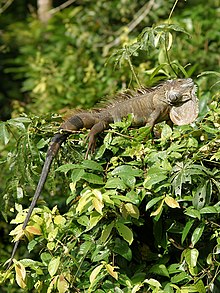Our website is made possible by displaying online advertisements to our visitors.
Please consider supporting us by disabling your ad blocker.
Green iguana
| Green iguana[1] | |
|---|---|

| |
| An adult green iguana in Costa Rica | |

| |
| A juvenile green iguana in Grand Cayman | |
| Scientific classification | |
| Domain: | Eukaryota |
| Kingdom: | Animalia |
| Phylum: | Chordata |
| Class: | Reptilia |
| Order: | Squamata |
| Suborder: | Iguania |
| Family: | Iguanidae |
| Genus: | Iguana |
| Species: | I. iguana
|
| Binomial name | |
| Iguana iguana | |
| Subspecies | |
| |

| |
| Native range in green (does not include the recent colonization of Anguilla in 1995 following hurricanes); introduced range in red | |
| Synonyms | |
The green iguana (Iguana iguana), also known as the American iguana or the common green iguana, is a large, arboreal, mostly herbivorous species of lizard of the genus Iguana. Usually, this animal is simply called the iguana. The green iguana ranges over a large geographic area; it is native from southern Brazil and Paraguay as far north as Mexico.
A herbivore, it has adapted significantly with regard to locomotion and osmoregulation as a result of its diet. It grows to 1.7 m (5.6 ft) in length from head to tail, although a few specimens have grown more than 2 m (6.6 ft) with bodyweights upward of 20 lb (9.1 kg).
Commonly found in captivity as a pet due to its calm disposition and bright colors, it can be very demanding to care for properly. Space requirements and the need for special lighting and heat can prove challenging to the hobbyist.
- ^ "Iguana iguana (Linnaeus, 1758)". Integrated Taxonomic Information System. Retrieved 4 September 2008.
- ^ "Fossilworks: Iguana iguana". Fossilworks.org. Archived from the original on 12 December 2021. Retrieved 11 March 2022.
- ^ "Fossilworks: Iguanidae". Fossilworks.org. Archived from the original on 12 December 2021. Retrieved 11 March 2022.
- ^ Bock, B.; Malone, C.L.; Knapp, C.; Aparicio, J.; Avila-Pires, T.C.S.; Cacciali, P.; Caicedo, J.R.; Chaves, G.; Cisneros-Heredia, D.F.; Gutiérrez-Cárdenas, P.; Lamar, W.; Moravec, J.; Perez, P.; Porras, L.W.; Rivas, G.; Scott, N.; Solórzano, A.; Sunyer, J. (2020) [amended version of 2018 assessment]. "Iguana iguana". IUCN Red List of Threatened Species. 2020: e.T174481A174437922. doi:10.2305/IUCN.UK.2020-2.RLTS.T174481A174437922.en. Retrieved 18 February 2022.
- ^ "Appendices | CITES". cites.org. Retrieved 2022-01-14.
Previous Page Next Page



